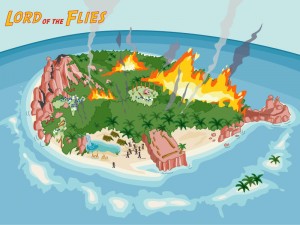The following is a guest article by our favorite English teach, Mr. James Lynch.

To all of you sitting before me, waiting for the pomp and circumstance, the speeches and distribution of degrees to be over, and celebratory parties to begin, I know exactly how you feel. Besides my own high school, college and master’s degree graduations, I’ve sat through forty high school graduation ceremonies as a teacher, and several high school, undergraduate and graduate ceremonies of my children. The speakers at all those graduations ranged from the mediocre to the bad and the ugly, and offered a mishmash of all the usual platitudes about changing the world you are about to enter. None of them addressed reality you now face.
What is it then that I know about what you are really feeling as you sit there restlessly in those uncomfortable chairs? First, I know that you feel a vague, existential unease about your life from now on. Although in high school you railed about being subjected to “totally unnecessary” rules that made you sometimes call your alma mater a prison, and although your college years seemed to swamp you with endless academic activity (unless of course you were on a four-year booze cruise with a beer-pong major), you lived for many years in a comfortable and protective womb with few real-world concerns – your rapidly approaching or accrued debt notwithstanding.
Now things look different. If you are an accounting major, for example, do you really look forward to sitting at a desk for twelve mind-numbing hours a day during income tax season, adding up columns of numbers and trying to decipher thousands of pages of the tax code? If you are leaving med school, do you look forward to years of the back breaking and sleep-deprived schedules of internship and residency? If you are graduating law school, does working 80 hours a week at a high-end law firm feel worth the prestige and financial reward? If you have a degree in such areas as the rapidly proliferating number of gender, ethnic or identity “studies,” do you wonder how flipping burgers at McDonalds will provide you with a living wage, along with the ability to pay back that crippling tuition debt?
This I know: The world can be and is often a cold and uncaring place. It simply doesn’t care about you or your wellbeing. You are not special; you are not entitled to anything; you are not guaranteed anything. You may die early via accident or disease, or you may die in your sleep at 100. That diploma or degree you receive means nothing to life. Life is one, big crapshoot, and life rolls your dice without preference or mercy. You will randomly encounter health or sickness, fortune or misfortune, love or loss. Life is only what you do with it, how you respond to whatever happens during it.
Somewhere in your life, however, fate will show you an alternative to whatever you are doing to provide for yourself. You must decide at that point, however, whether the opportunity that beckons is offering an inspiring or evil alternative. You can choose the path of Winston Churchill, or Hitler (who was an altar boy) and Stalin (who once studied for the priesthood). Fate may offer cruel power and riches, or an opportunity to facilitate peace and justice. You alone must decide. Our flawed nature, as described in every early mythological story and religious text, can lure us into dangerous territory.
Here’s the real truth. Except in rare cases (even in the medical or legal fields) you will not anticipate either option. Hell, if you are typical you’ve probably changed majors three or four times while in college. If you are headed for college next year, you will likely change majors that many times yourself – and take more than four years to graduate as a result. You may even drop out and not graduate at all. The old saying that if you want to make God laugh, tell him your plans has never been more appropriate.
No, the truth known to those who have sat in these seats before you is that your careers will choose you. And if you resist being beckoned by fate into a virtuous occupation, for financial of any other reasons, you will likely lead a miserable and unsatisfactory life. That decision will be yours alone. You may drive a Lamborghini and live in an exclusive and gated community, but you will die unhappy. Your tombstone will read, “He had the most toys, but died an unfulfilled human being.” Unless you consciously direct your talents and abilities toward a foreordained and rewarding purpose, your life will be wasted, and society will lose your unrealized contributions.
Before they met and pursued their appointed destinies, Walt Disney was a newspaper editor (fired for lacking imagination), Neil Armstrong drove a tomato truck for a local cannery and sold kitchen knives door-to-door, Julia Child was a CIA intelligence officer, Harrison Ford was a carpenter, Elvis Costello was a computer programmer, Allen Ginsberg was a dishwasher, Andrea Bocelli was a lawyer, Brad Pitt was a limo driver, Sylvester Stallone worked in a deli, Paul Newman sold encyclopedias from door-to-door, and Whoopi Goldberg worked at a funeral parlor applying makeup to corpses. Their transitions were certainly not easy, or without sacrifice and struggle, but a leap of faith – a belief in fate and oneself – made their lives meaningful and their contributions to society manifold.
Fate tapped me on the shoulder early in life, but doubt and uncertainty kept me from my appointed profession until a combination of circumstances shook me by those shoulders, looked me in the eye and told me that I could either spend my life as a miserable salesman (or in any other occupation really), or accept my calling as an educator. Fate had her work cut out for her, as I was absolutely terrified of public speaking, and convinced that no one would be interested in my opinions. Time, circumstance and a good number of patient mentors eventually led me to my personal leap of faith.
After four decades in education, I look back on a career filled with pride and satisfaction. I was once petrified at the thought of standing before students and attempting to provide information pertinent to their lives. That job, I told myself, was for people much more intellectual and erudite. It took two attempts to finally get it right, to feel the vibe that only teachers know when instructor and students interact in the harmony of sharing the knowledge and wisdom of the ages. When teacher and student understand their interdependence in that process, there exists a connection like no other.
So be patient my dear graduates. Test the waters of various occupations and pay attention, not to the monetary, material or social aspects of the job, but to how it makes you feel at the end of the day. Are you simply drained from exertion, or are you also experiencing an equivalent personal satisfaction? Are you happy? When your appointed fate beckons with a good life, you will know it. Lady fate may frighten you with challenging odds, daunting logistics and numerous what ifs, but she will know you better than you know yourself. Trust her, believe her, and take her by the hand. You will never look back on the choice without a smile and an understanding that your life has meaning.
When you meet her, say hello for me, and tell her I’m grateful.
Congratulations and good luck in your future endeavors.
Jim Lynch
Fleetwood, PA
————–
If you’d like to provide any feedback to Mr. Lynch, he can be reached at jimadalynch(at)gmail.com. You’ll need to fix that email to use it, by substituting the @ symbol for the (at) characters


